What the gift of clean water brings
New wells built with the support of MCC and Congolese Mennonite Brethren save time and improve health
The path that teenage sisters Léonie and Channele Kingenzi used to navigate to bring water home from the Kanzombi spring is steep and uneven. Their flip-flops searched for footholds among the rocks and roots of the leaf-covered path as they each balanced a full, six-gallon, yellow container of water on their heads.
On a good morning, they would return in one hour from the spring to their home in Kanzombi, an area on the outskirts of the city of Kikwit in Kwilu Province in the Democratic Republic of the Congo (DR Congo). The water would be enough for their mother to cook and for them and their three younger siblings to bathe before school started.
On bad mornings at the spring, fights erupted between youth who wanted water first — delaying the line, preventing the sisters from getting water for three or four hours and making them late for school. As newcomers to the area in 2017, they were sometimes beaten, and once they came home with no water, says their mother, Germaine Kambundi.
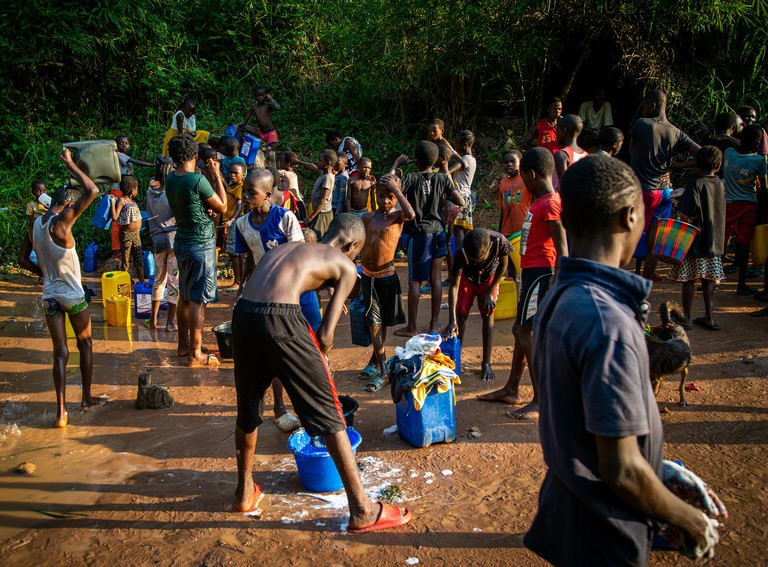
All this for water that made people sick anyway.
The spring water is contaminated by waste matter that leaches into the water supply from the soil above the spring, says Dr. Jacques Tangudiki, who treats people at the hospital in Kanzombi. It causes stomach pain and diarrhea, sometimes typhoid and, at worst, cholera, which can be deadly in 24 hours if not treated.
But people had little choice. The only potable water in this area for years was from government-operated wells that are too expensive for those who subsist on what they can grow and sell.
The lack of clean water is a long-time misery. But the problems — from the need to the tensions at springs and the illnesses — exploded as some 15,000 people fled into Kikwit in 2017.
Survivors of brutal fighting in the Kasai region, they came with burns, wounds from machetes and babies about to be born. They were exhausted from walking for weeks or months from various regions of neighboring Kasai Province without much food or water. They carried emotional wounds from watching their family members and neighbors massacred in front of them.
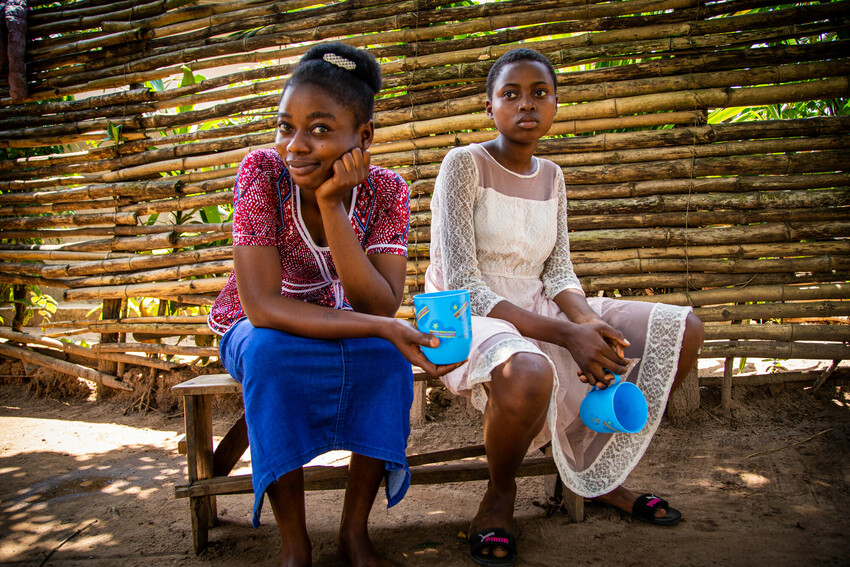
The Communauté des Eglises de Frères Mennonites au Congo (CEFMC; Community of Mennonite Brethren Churches in Congo), which is based in Kikwit, saw their need.
Individuals responded by taking people into their homes and giving clothing and food. The CEFMC hospital staff provided medical care, and Mennonite Brethren churches became temporary shelters.
Over time, CEFMC built up a broad support system for the displaced people in the community and the host families sheltering them — including providing support for education, primary health care and fields for farming.
The church is called to meet the physical and spiritual needs of its people, says Antoine Kimbila, general secretary of CEFMC. He compares CEFMC’s work with the story of how Jesus fed the crowd, distributing fish and bread to those who had grown hungry listening to him preach.
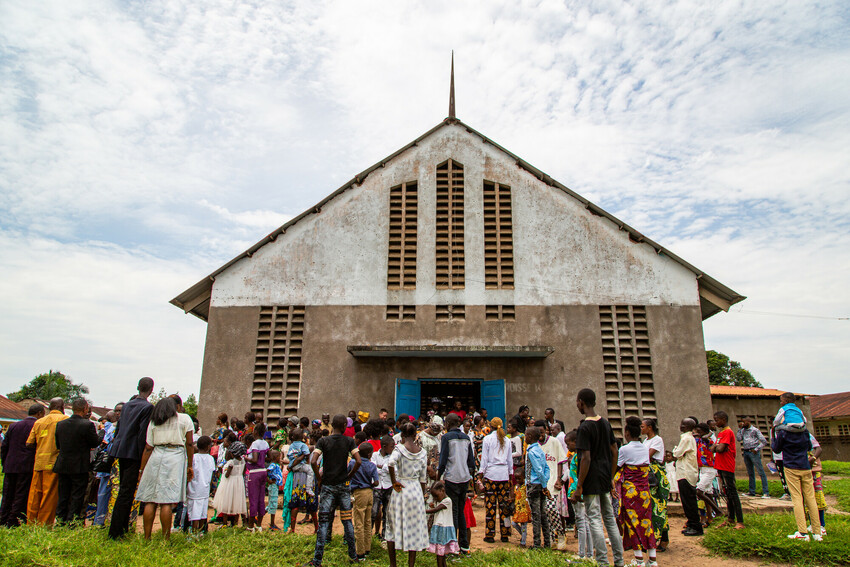
"God takes care of us, not just spiritually, but physically, too."
Jesus came, Kimbila says, not just to save the soul but also the body. “Salvation is total, and salvation is holistic. God takes care of us, not just spiritually, but physically, too. For this reason, we as the church work with partners to save people holistically.” He adds, “It’s difficult to bring someone who is hungry to peace.”
Having clean water is a key component of this effort.
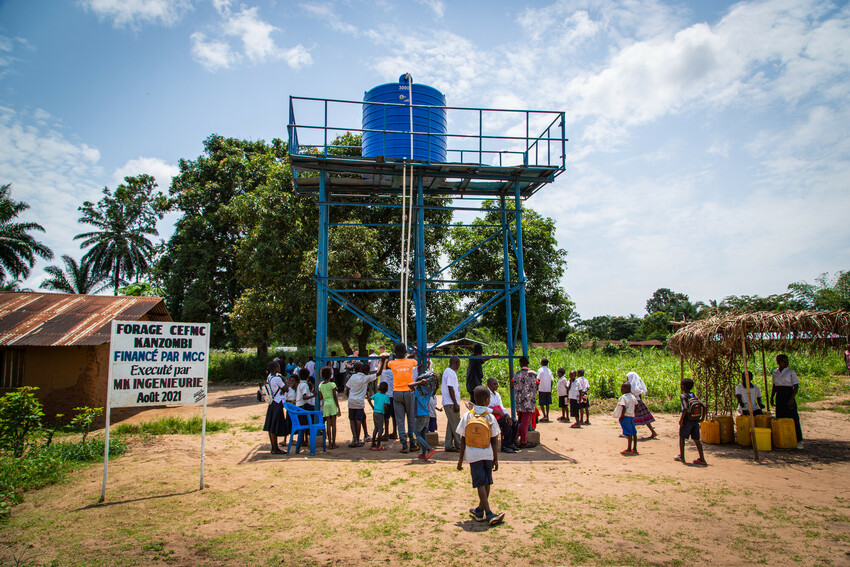
"We went from 38% to 9% of waterborne diseases."
With MCC’s support, CEFMC drilled a well in Kanzombi in October 2021, a second one in another part of Kikwit in 2022 and another in a third location this past summer.
Even before the third well was completed, the results were dramatic.
“We went from 38% to 9% of waterborne diseases,” says Tangudiki, who coordinates primary health care for displaced people on behalf of CEFMC.
The wells are between 120-130 meters (or about 400 feet) deep. Two or three times a day, water is pumped from each well to fill an elevated water tank. The first tank built holds 2,000 liters (528 gallons) of water, while the second and third hold 3,000 liters (almost 800 gallons). Water flows by gravity from the tanks to two water taps where people come to fill their water containers.
At the water tap for the well built in 2022, CEFMC hired Benedicte Masamba, a displaced woman, to collect money and maintain order. She charges displaced people and host families 100 Congolese francs (four cents) for one container or jerrycan, which is half the cost of public water. Other community members pay 150 francs (six cents).
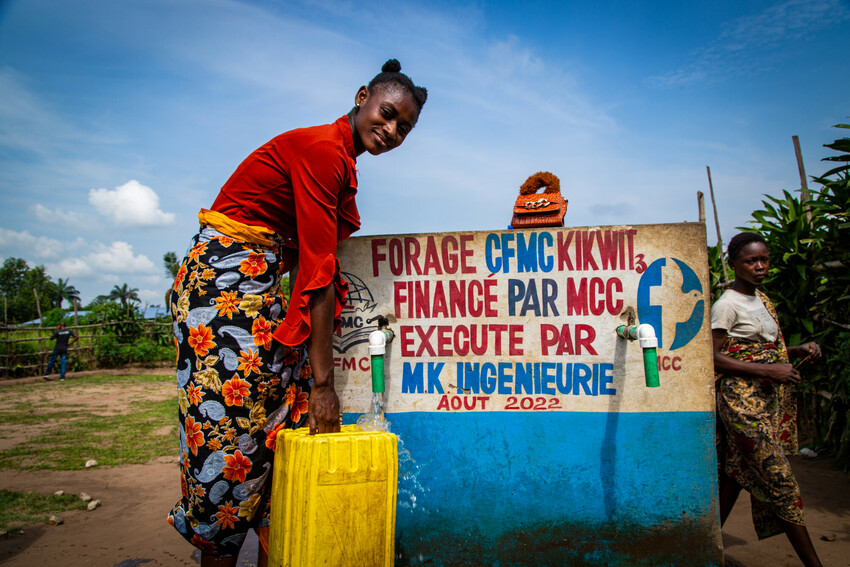
Although Masamba has hearing loss caused by the sound of weaponry, she is able to chat with people as she helps them fill the containers and lift them onto people’s heads if needed. She makes sure that pregnant women and people with disabilities get water first. The most vulnerable are allowed to get water for free.
Having access to clean water, alongside the other support, is making a difference for Kambundi and her family.
Kambundi and her children, like others who were displaced, arrived in the area traumatized, physically ill and in need of peace. They had walked for months after escaping the people who beheaded their husband and father. Kambundi was hoping to find her own father in Kikwit, but he had died and his house had been sold.
Jacqueline Kafuti, a community organizer and a Mennonite Brethren elder, took the family into her home to live with her husband and five children.
In February, Kambundi was harvesting cassava to eat and sell. She has maize and groundnut seeds saved from a previous harvest to plant in the future and was able to rent a house using the proceeds from crops she grew and some side jobs. Her younger children get notebooks, pens and other school supplies and Channele’s tuition in secondary school is paid. Léonie has graduated.
Kambundi’s family has access to basic health care through CEFMC. When her 11-year-old daughter, Angele Kingenzi, had a fever for three days, she was tested for malaria and given medication at no cost.
And the family has clean drinking water.
Kambundi says her children are no longer getting sick with stomach ailments, and she appreciates that the well, or borehole, is just a few minutes from her house. “We have freedom of getting water any time we like since MCC has placed the borehole here.”
Give the gift of clean water
Every donation makes a difference.

